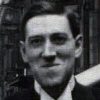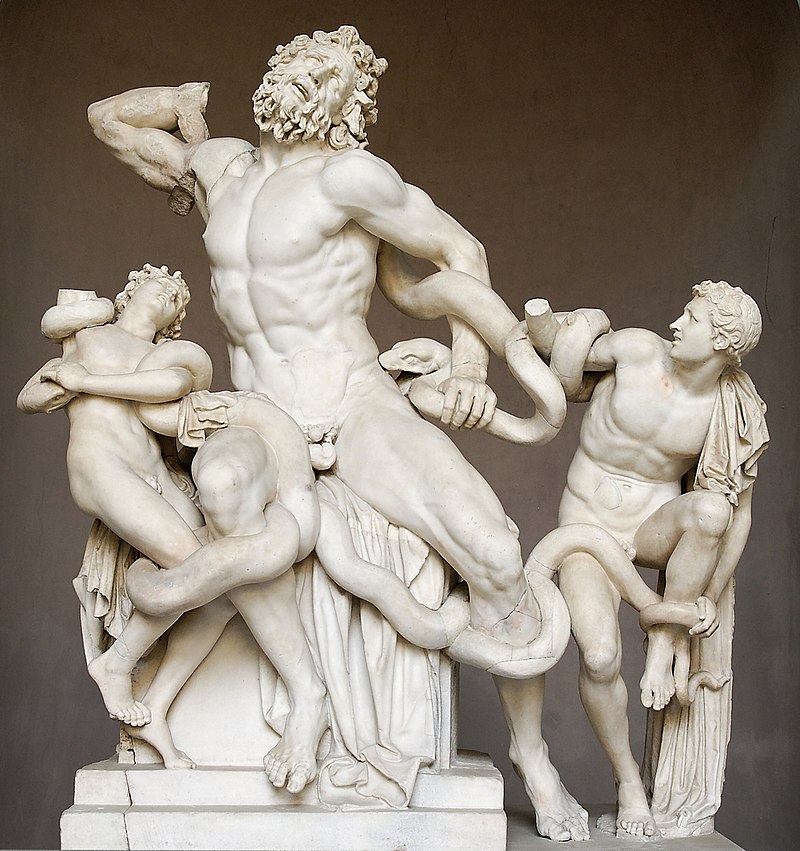Do not ask, Reader, how my blood ran cold
and my voice choked up with fear. I cannot write it:
this is a terror that cannot be told.
I did not die, and yet I lost life’s breath:
imagine for yourself what I became,
deprived at once of both my life and death.[Com’io divenni allor gelato e fioco,
nol dimandar, lettor, ch’i’ non lo scrivo,
però ch’ogne parlar sarebbe poco.
Io non mori’ e non rimasi vivo;
pensa oggimai per te, s’ hai fior d’ingegno,
qual io divenni, d’uno e d’altro privo.]Dante Alighieri (1265-1321) Italian poet
The Divine Comedy [Divina Commedia], Book 1 “Inferno,” Canto 34, l. 22ff (34.22-27) (1309) [tr. Ciardi (1954)]
(Source)
Dante the Pilgrim finally sees Satan at the bottom and center of Hell. That would seem to be terrifying enough for this aside to the reader, but various translators and commentators try to cast it as some great theological metaphor.
(Source (Italian)). Alternate translations:
How frozen I was then, and hoarse with cold,
Reader, ask not; for I nought of it write,
As 'twill too little prove, whate'er I say
I did not die, nor yet alive remain'd.
Think for yourself, if you have any sense,
What I then was, depriv'd of Life and Death.
[tr. Rogers (1782)]
While nature thro' my nerves convulsive shook:
New palsies seiz'd my agonizing frame,
And glowing now I felt the fever's flame.
While life and death by turns my limbs forsook.
[tr. Boyd (1802), st. 6]
How frozen and how faint I then became,
Ask me not, reader! for I write it not,
Since words would fail to tell thee of my state.
I was not dead nor living. Think thyself
If quick conception work in thee at all,
How I did feel.
[tr. Cary (1814)]
Ask me not, reader, how both hoarse and cold
I then became; I write it not, nor strive
To tell what never might by speech be told.
There I nor died, nor yet remained alive:
Now think, if thou hast power of thought, and see
What state was mine, that could of both deprive.
[tr. Dayman (1843)]
How icy chill and hoarse I then became, ask not, O Reader! for I write it not, because all speech would fail to tell.
I did not die, and did not remain alive: now think for thyself, if thou hast an grain of ingenuity, what I became, deprived of both death and life.
[tr. Carlyle (1849)]
How freezing then, how feeble I became,
Ask not, thou reader! for I cannot write;
For every language must fall short in flight.
I neither died, nor yet remained alive!
Think within thyself, if ingenious deft,
How I became of strength and heat bereft.
[tr. Bannerman (1850)]
How terror-frozen I became and faint,
Ask not, oh reader, what I cannot write,
For all that I could say would feeble seem.
I did not die, I scarcely was alive;
Hast thou one spark of fancy, think thou then
How I became who knew nor death nor life.
[tr. Johnston (1867)]
How frozen I became and powerless then,
Ask it not, Reader, for I write it not,
Because all language would be insufficient.
I did not die, and I alive remained not;
Think for thyself now, hast thou aught of wit,
What I became, being of both deprived.
[tr. Longfellow (1867)]
How I then became frozen and weak, do not ask, reader, for I do not write it, seeing that every speech would be too little. I did not die and did not remain alive; think now for thyself, if thou hast a grain of wit, what I became, being deprived of one and the other.
[tr. Butler (1885)]
How frozen I became, and weak of grace,
From writing, reader, let me now be shrived,
For every speech were weak such state to trace.
I did not die, and yet no longer lived;
Think for thyself, if thou hast Fancy's bloom,
What I became, of death and life deprived.
[tr. Minchin (1885)]
How I became then chilled and hoarse, ask it not, Reader, for I write it not, because all speech would be little. I did not die, and I did not remain alive. Think now for thyself, if thou hast grain of wit, what I became, deprived of one and the other.
[tr. Norton (1892)]
How frozen I became thereat, how fainting,
Ask it not, reader, for I do not write it.
For all that I could say would be but little.
I did not die, nor yet remained I living.
Bethink thee now, if aught of wit thou claimest,
What I became, bereft of both together.
[tr. Griffith (1908)]
How chilled and faint I turned then, do not ask, reader, for I do not write it, since all words would fail. I did not die and I did not remain alive; think now for thyself, if thou hast any wit, what I became, denied both death and life.
[tr. Sinclair (1939)]
How faint I then became, how frozen cold,
Ask me not, Reader; for I write it not,
Because all speech would fail, whate'er it told.
I died not, yet of life remained no jot.
Think thou then, if of wit thou hast any share,
What I became, deprived of either lot.
[tr. Binyon (1943)]
How cold I grew, how faint with fearfulness,
Ask me not. Reader; I shall nor waste breath
Telling what words are powerless to express;
This was not life, and yet it was not death;
If thou hast wit to think how I might fare
Bereft of both, let fancy aid thy faith.
[tr. Sayers (1949)]
How frozen and faint I then became, ask it not, reader, for I do not write it, because all words would fail. I did not die and I did not remain alive: now think for yourself, if you have any wit, what I became, deprived alike of death and life!
[tr. Singleton (1970)]
How chilled and nerveless. Reader, I felt then;
do not ask me -- I cannot write about it --
there are no words to tell you how I felt.
I did not die -- I was not living either!
Try to imagine, if you can imagine,
me there, deprived of life and death at once.
[tr. Musa (1971)]
O reader, do not ask of me how I
grew faint and frozen then -- I cannot write it:
all words would fall far short of what it was.
I did not die, and I was not alive; v think for yourself, if you have any wit,
what I became, deprived of life and death.
[tr. Mandelbaum (1980)]
How frozen and how faint I then became,
Do not enquire, reader, description is useless,
For any speech would be inadequate.
I did not die, nor yet remain alive:
Think for yourself, if you have a trace
Of intellect, how I was, in that condition.
[tr. Sisson (1981)]
How chilled and faint I was
On hearing that, you must not ask me, reader --
I do not write it, words would not suffice:
I neither died, nor kept alive -- consider
With your own wits what I, alike denuded
Of death and life, became as I heard my leader.
[tr. Pinsky (1994)]
How then I became frozen and feeble, do not ask, reader, for I do not write it, and all speech would be insufficient.
I did not die and I did not remain alive: think now for yourself, if you have wit at all, what I became, deprived of both.
[tr. Durling (1996)]
Reader, do not ask how chilled and hoarse I became, then, since I do not write it, since all words would fail to tell it. I did not die, yet I was not alive. Think, yourself, now, if you have any grain of imagination, what I became, deprived of either state.
[tr. Kline (2002)]
How weak I now became, how faded, dry --
reader, don’t ask, I shall not write it down --
for anything I said would fall far short.
I neither died nor wholly stayed alive.
Just think yourselves, if your minds are in flower,
what I became, bereft of life and death.
[tr. Kirkpatrick (2006)]
Then how faint and frozen I became,
reader, do not ask, for I do not write it,
since any words would fail to be enough.
It was not death, nor could one call it life.
Imagine, if you have the wit,
what I became, deprived of either state.
[tr. Hollander/Hollander (2007)]
Don't ask me, reader, how frozen and faint I felt:
I cannot write it, because no matter what words
I used, or how many, none would be sufficient.
I did not die, I did not remain in that world.
Just ask yourself, if you have a mind to work with,
In what condition I was, not dead, not alive?
[tr. Raffel (2010)]
Reader, don’t ask how chill and faint I turned:
I couldn't write it. All the words would fail.
I didn't die, but couldn't live. I learned
What living death and death-in-life entail.
But you must ponder, if you have the wit,
What I, denied both life and death, became.
[tr. James (2013), l. 28ff]
Quotations about:
horror
Note not all quotations have been tagged, so Search may find additional quotes on this topic.
Terror,
Terror and silence were all I found.[Horror ubique animo, simul ipsa silentia terrent.]
Virgil (70-19 BC) Roman poet [b. Publius Vergilius Maro; also Vergil]
The Aeneid [Ænē̆is], Book 2, l. 755 (2.755) (29-19 BC) [tr. Humphries (1951)]
(Source)
Aeneas recounting searching fallen Troy for his lost wife. (Source (Latin)). Alternate translations:
Horror each where, nay silence strikes a feare.
[tr. Ogilby (1649)]
All things were full of horror and affright,
And dreadful even the silence of the night.
[tr. Dryden (1697)]
Horror on all sides, and at the same time the very silence affrights my soul.
[tr. Davidson/Buckley (1854)]
A shuddering on my spirit falls,
And e'en the silence' self appals.
[tr. Conington (1866)]
Everywhere horror fills my soul, and even
The silence terrifies.
[tr. Cranch (1872)]
Everywhere my spirit shudders, dismayed at the very silence.
[tr. Mackail (1885)]
While on the heart lies weight of fear, and e'en the hush brings dread.
[tr. Morris (1900)]
Horror waits
Around; the very silence breeds affright.
[tr. Taylor (1907), st. 102, ll. 912-13]
On all sides round
horror spread wide; the very silence breathed
a terror on my soul.
[tr. Williams (1910)]
Everywhere dread fills my heart; the very silence, too, dismays.
[tr. Fairclough (1916)]
Everywhere
Dread and the sheer silence reduced my courage to nothing.
[tr. Day Lewis (1952)]
My spirit is held by horror everywhere;
even the very silence terrifies.
[tr. Mandelbaum (1971), ll. 1017-18]
And everywhere my heart misgave me: even
Stillness had its terror.
[tr. Fitzgerald (1981), ll. 983-84]
Horror was everywhere and the very silence chilled the blood.
[tr. West (1990)]
Everywhere the terror in my heart, and the silence itself,
dismay me.
[tr. Kline (2002)]
Everywhere there was fear. The very silence
Was terrifying.
[tr. Lombardo (2005), ll. 890-91]
With terror at every turn, the very silence makes me cringe.
[tr. Fagles (2006), l. 937]
Horror filled me everywhere, the very silence scared me.
[tr. Bartsch (2021)]
It seems war stories aren’t very well received at this point. I’m told they’re outdated, untimely and as might be expected — make some unpleasant reading. And, as you have no doubt already perceived, human beings don’t like to remember unpleasant things. They gird themselves with the armor of wishful thinking, protect themselves with a shield of impenetrable optimism, and, with a few exceptions, seem to accomplish their “forgetting” quite admirably. But you, my children, I don’t want you to be among those who choose to forget. I want you to read my stories and a lot of others like them. I want you to fill your heads with Remarque and Tolstoy and Ernie Pyle. I want you to know what shrapnel, and “88’s” and mortar shells and mustard gas mean. I want you to feel, no matter how vicariously, a semblance of the feeling of a torn limb, a burnt patch of flesh, the crippling, numbing sensation of fear, the hopeless emptiness of fatigue. All these things are complementary to the province of War and they should be taught and demonstrated in classrooms along with the more heroic aspects of uniforms, and flags, and honor and patriotism.
Rod Serling (1924-1975) American screenwriter, playwright, television producer, narrator
“First Squad, First Platoon,” Dedication (c. 1947)
(Source)
Dedication to his unborn children, in one of his first (unpublished) works of fiction, while at Antioch College under the GI Bill. In Anne Serling, As I Knew Him: My Dad, Rod Serling (2013)
The most merciful thing in the world, I think, is the inability of the human mind to correlate all its contents. We live on a placid island of ignorance in the midst of black seas of infinity, and it was not meant that we should voyage far. The sciences, each straining in its own direction, have hitherto harmed us little; but some day the piecing together of dissociated knowledge will open up such terrifying vistas of reality, and of our frightful position therein, that we shall either go mad from the revelation or flee from the deadly light into the peace and safety of a new dark age.
H. P. Lovecraft (1890-1937) American fabulist [Howard Phillips Lovecraft]
“The Call of Cthulhu,” ch. 1, opening words (1928)
(Source)
He said the wicked know that if the ill they do be of sufficient horror men will not speak against it. That men have just enough stomach for small evils and only these will they oppose.
Cormac McCarthy (1933-2023) American novelist, playwright, screenwriter
The Crossing (2010)
(Source)
It’s probably wrong to believe there can be any limit to the horror which the human mind can experience. On the contrary, it seems that some exponential effect begins to obtain as deeper and deeper darkness falls — as little as one may like to support the idea that when the nightmare grows black enough, horror spawns horror, one coincidental evil begets other, often more deliberate evils, until finally blackness seems to cover everything.
And the most terrifying question of all may be just how much horror the human mind can stand and still maintain a wakeful, staring, unrelenting sanity. That such events have their own Rube Goldberg absurdity goes almost without saying. At some point, it all starts to become rather funny. That may be the point at which sanity begins either to save itself or to buckle and break down; that point at which one’s sense of humor begins to reassert itself.
More to the point, nameless hideous monsters are freaking terrifying. You always fear what you don’t know, what you don’t understand, and the first step to having understanding of something is to know what to call it. It’s a habit of mine to give names to anything I wind up interacting with if it doesn’t have one readily available. Names have power — magically, sure, but far more important, they have psychological power. Something horrible with a name holds less power over you, less terror, than something horrible without one.
“Octokongs,” I pronounced grimly. “Why did it have to be octokongs?”
I think there’s a lot of people out there who say we must not have horror in any form, we must not say scary things to children because it will make them evil and disturbed. … That offends me deeply, because the world is a scary and horrifying place, and everyone’s going to get old and die, if they’re that lucky. To set children up to think that everything is sunshine and roses is doing them a great disservice. Children need horror because there are things they don’t understand. It helps them to codify it if it is mythologized, if it’s put into the context of a story, whether the story has a happy ending or not. If it scares them and shows them a little bit of the dark side of the world that is there and always will be, it’s helping them out when they have to face it as adults.
Joss Whedon (b. 1964) American screenwriter, author, producer [Joseph Hill Whedon]
Interview with Michael Silverberg (NPR)
(Source)
“What,” asked Mr. Croup, “do you want?”
“What,” asked the marquis de Carabas, a little more rhetorically, “does anyone want?”
“Dead things,” suggested Mr. Vandemar. “Extra teeth.”
I shudder as I tell the tale.
[Horresco réferens]
Virgil (70-19 BC) Roman poet [b. Publius Vergilius Maro; also Vergil]
The Aeneid [Ænē̆is], Book 2, l. 204 (2.204) [Aeneas] (29-19 BC) [tr. Fairclough (1916)]
(Source)
Telling Dido of the terrible deaths of the Trojan priest Laocoön and his sons.
(Source (Latin)). Alternate translations:
I shake to mention.
[tr. Ogilby (1649)]
I shudder at the relation.
[tr. Davidson/Buckley (1854)]
I quail,
E'en now, at telling of the tale
[tr. Conington (1866)]
I shudder as I tell.
[tr. Cranch (1872)]
I shudder as I recall.
[tr. Mackail (1885)]
I tremble in the tale.
[tr. Morris (1900)]
The tale I shudder to pursue
[tr. Taylor
(1907)]I shudder as I tell.
[tr. Williams (1910)]
I shudder even now,
Recalling it.
[tr. Humphries (1951)]
Telling it makes me shudder.
[tr. Day-Lewis (1952)]
I shudder
to tell what happened.
[tr. Mandelbaum (1971)]
I shiver to recall it.
[tr. Fitzgerald (1981)]
I shudder at the memory of it.
[tr. West (1990)]
I shudder to tell it.
[tr. Kline (2002)]
I shudder to recall them.
[tr. Lombardo (2005)]
I cringe to recall it now.
[tr. Fagles (2006)]
I shudder at the telling.
[tr. Bartsch (2021)]
A Degree of Fear sharpeneth, the Excess of it stupifieth.
George Savile, Marquis of Halifax (1633-1695) English politician and essayist
“Fear,” Political, Moral and Miscellaneous Reflections (1750)
(Source)














